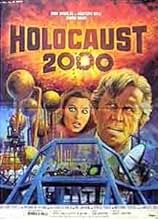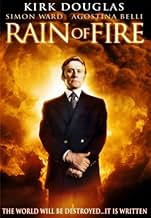IMDb रेटिंग
5.5/10
1.7 हज़ार
आपकी रेटिंग
अपनी भाषा में प्लॉट जोड़ेंRobert's in charge of constructing a nuclear power plant in the Middle East. Will it be instrumental in prophecies of antichrist's apocalypse?Robert's in charge of constructing a nuclear power plant in the Middle East. Will it be instrumental in prophecies of antichrist's apocalypse?Robert's in charge of constructing a nuclear power plant in the Middle East. Will it be instrumental in prophecies of antichrist's apocalypse?
- पुरस्कार
- कुल 1 नामांकन
Spyros Fokas
- Colonel Harbin
- (as Spiros Focas)
Caroline Langrishe
- Girlfriend
- (as Caroline Horner)
कहानी
क्या आपको पता है
- ट्रिवियाThe film was released with two endings. The European general release version of the film features an open ending, with Kirk Douglas in exile with his newborn child, and his adult son now successfully developing the plant intended to cause Armageddon. In the shortened version released in U.S. theaters, home video, and network television, a new ending was added where Douglas returns to the company and enters a board meeting having explosives hidden on him. In the final scene, Angel's face is overlaid with an image of an explosion, showing that Robert has successfully thwarted the apocalypse. The U.S. DVD from Lionsgate retains the original darker ending and the Blu-ray from Scream Factory contains both the European and American versions of the film.
- इसके अलावा अन्य वर्जनThe European general release version of the film features an open ending, where Kirk Douglas is in exile with his newborn child, and his adult son now successfully operating the nuclear plant that is intended to cause Armageddon. In the shortened version released in U.S. theaters, home video, and network television, a new ending was added where Douglas returns to America and blows up the plant, sacrificing himself in the process. The U.S. DVD from Lionsgate retains the original darker ending.
- कनेक्शनFeatured in Trailer Trauma (2016)
फीचर्ड रिव्यू
There's no question about it: Italian film-makers used to make the most enjoyable crap and this one is a prime example. Whenever a Hollywood movie became a runaway box office success, the Italians would waste no time in making their own carbon copy of it and, in this field, director Alberto De Martino was one of the top "go to" guys in the country; having recently made his own "pasta" versions of THE GODFATHER (1972) and THE EXORCIST (1973) in THE COUNSELLOR (1973) and THE ANTICHRIST (1974) respectively it was natural for him to be entrusted with concocting an Italianized clone of THE OMEN (1976). As it happens, this was an Italo-British co-production (as that impressively star-studded cast can attest) and the end result is, as I said, far more enjoyable than a half-arsed imitation has any right to be.
The film's ageing American star, Kirk Douglas (in the first of 4 horror/sci-fi outings he did in quick succession the others being Brian De Palma's disappointing THE FURY [1978], the maligned-but-fair SATURN 3 [1980] and THE FINAL COUNTDOWN [1980], which I haven't watched in ages), does have one up on Gregory Peck from THE OMEN in that he gets to share a nude love scene with leading lady Agostina Belli! The rest of the cast, unsurprisingly, is a mix of established Brits and Italians: Geoffrey Keen, Alexander Knox (as the requisite professor who unravels the diabolical scheme and who's given a memorably subtle death scene), Virginia McKenna (like in the subsequent BLOOD LINK [1982], also from De Martino, she's killed off during the opening scenes!), Anthony Quayle, Simon Ward (effectively cast as a cold-blooded Antichrist), as well as Adolfo Celi and Romolo Valli (playing the equally indispensable and ill-fated priest).
The plot comes up with an ingenious modernization of the Apocalypse prophecies, illustrating a plausible analogy between mythical and modern monsters. Among the film's most notable sequences is Douglas' surreal nightmare (in which he's stranded stark naked in the desert, witnesses the demons rising from the sea and is haunted by the presence of a religious fanatic in a Diabolik-like outfit!) and one where a Middle Eastern political leader opposed to industrial progress gets the top of his head chopped off by a helicopter blade (thus anticipating the more celebrated moment in George A. Romero's DAWN OF THE DEAD [1978]). Once again, Ennio Morricone's score may sound overly-familiar (given that he composed THE ANTICHRIST and also EXORCIST II THE HERETIC [1977]) but there's no denying that it serves the taut proceedings admirably.
Ultimately, though, the film results in not being at all scary: for one thing, the Antichrist has no direct relation to the 'accidental' deaths of those who stand in his way; also, he's left pretty much to his own devices (with no diabolical helpers as in THE OMEN), yet, nobody ever seems to question his decisions. Besides, there's no explanation as to just how Ward became "the chosen" (one of the titles by which the film's also known, as seen in an alternate opening sequence included on the DivX copy I watched) in THE OMEN, at least, it was a case of babies exchanged at birth! Other narrative flaws: why is the Agostina Belli character afraid of entering a church considering that the child she's carrying turns out not to be the Antichrist after all (as Douglas himself had feared)?; the second scene in the psycho ward (with the religious fanatic going berserk and inciting his fellow inmates to kill Douglas) is baffling and somewhat redundant since the latter has, by this time, become aware of Ward's true intentions!
The film concludes rather abruptly with the fairly ludicrous and pretentious suggestion of a new 'Holy Family'; I much preferred the alternate ending also found on the (once again) problematic DivX copy I have, after missing out on this title more than I care to remember on Italian TV over the years: while admittedly conventional, at least, we're shown Douglas willing to keep up the fight the only way he knows how through violence. Finally, I have to wonder what's holding up the film's release on DVD; it doesn't seem to be available in any region and, while no classic, it's eminently watchable apart from being, definitely, a commercially viable item (especially for fans of "Euro-Cult")...
The film's ageing American star, Kirk Douglas (in the first of 4 horror/sci-fi outings he did in quick succession the others being Brian De Palma's disappointing THE FURY [1978], the maligned-but-fair SATURN 3 [1980] and THE FINAL COUNTDOWN [1980], which I haven't watched in ages), does have one up on Gregory Peck from THE OMEN in that he gets to share a nude love scene with leading lady Agostina Belli! The rest of the cast, unsurprisingly, is a mix of established Brits and Italians: Geoffrey Keen, Alexander Knox (as the requisite professor who unravels the diabolical scheme and who's given a memorably subtle death scene), Virginia McKenna (like in the subsequent BLOOD LINK [1982], also from De Martino, she's killed off during the opening scenes!), Anthony Quayle, Simon Ward (effectively cast as a cold-blooded Antichrist), as well as Adolfo Celi and Romolo Valli (playing the equally indispensable and ill-fated priest).
The plot comes up with an ingenious modernization of the Apocalypse prophecies, illustrating a plausible analogy between mythical and modern monsters. Among the film's most notable sequences is Douglas' surreal nightmare (in which he's stranded stark naked in the desert, witnesses the demons rising from the sea and is haunted by the presence of a religious fanatic in a Diabolik-like outfit!) and one where a Middle Eastern political leader opposed to industrial progress gets the top of his head chopped off by a helicopter blade (thus anticipating the more celebrated moment in George A. Romero's DAWN OF THE DEAD [1978]). Once again, Ennio Morricone's score may sound overly-familiar (given that he composed THE ANTICHRIST and also EXORCIST II THE HERETIC [1977]) but there's no denying that it serves the taut proceedings admirably.
Ultimately, though, the film results in not being at all scary: for one thing, the Antichrist has no direct relation to the 'accidental' deaths of those who stand in his way; also, he's left pretty much to his own devices (with no diabolical helpers as in THE OMEN), yet, nobody ever seems to question his decisions. Besides, there's no explanation as to just how Ward became "the chosen" (one of the titles by which the film's also known, as seen in an alternate opening sequence included on the DivX copy I watched) in THE OMEN, at least, it was a case of babies exchanged at birth! Other narrative flaws: why is the Agostina Belli character afraid of entering a church considering that the child she's carrying turns out not to be the Antichrist after all (as Douglas himself had feared)?; the second scene in the psycho ward (with the religious fanatic going berserk and inciting his fellow inmates to kill Douglas) is baffling and somewhat redundant since the latter has, by this time, become aware of Ward's true intentions!
The film concludes rather abruptly with the fairly ludicrous and pretentious suggestion of a new 'Holy Family'; I much preferred the alternate ending also found on the (once again) problematic DivX copy I have, after missing out on this title more than I care to remember on Italian TV over the years: while admittedly conventional, at least, we're shown Douglas willing to keep up the fight the only way he knows how through violence. Finally, I have to wonder what's holding up the film's release on DVD; it doesn't seem to be available in any region and, while no classic, it's eminently watchable apart from being, definitely, a commercially viable item (especially for fans of "Euro-Cult")...
- Bunuel1976
- 26 जुल॰ 2007
- परमालिंक
टॉप पसंद
रेटिंग देने के लिए साइन-इन करें और वैयक्तिकृत सुझावों के लिए वॉचलिस्ट करें
- How long is The Chosen?Alexa द्वारा संचालित
विवरण
इस पेज में योगदान दें
किसी बदलाव का सुझाव दें या अनुपलब्ध कॉन्टेंट जोड़ें




































